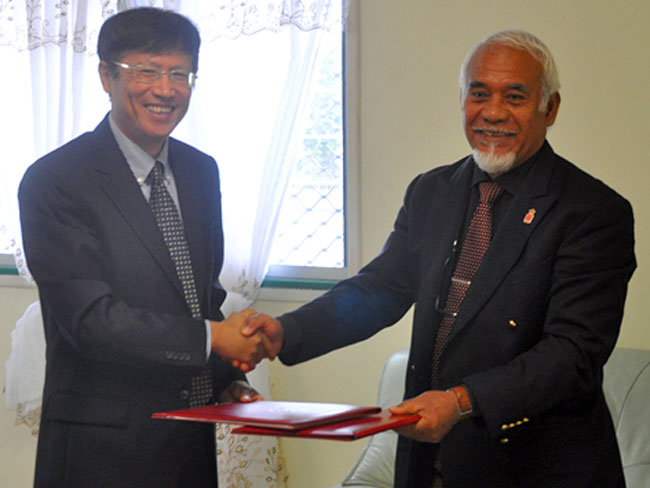
Tonga’s goal of opening up a potential new market in China for its squash exports is another step closer.
This week Chinese and Tongan officials agreed on the standards and processes that need to be met for a successful squash export partnership between the two countries.
An “initial protocol” confirming the terms of agreement for Tonga’s squash exports to China was initialed by China’s Ambassador to Tonga, HE Huang Huanguang, and Tonga’s Minister for Agriculture, Food, Forestry and Fisheries, Hon. Semisi Fakahau, on 12 May 2016.
Mr Li Guodong, Second Secretary at the Chinese Embassy in Tonga, said yesterday that for the export of squash to go ahead, the first step was for both parties to agree to what needs to be included in a protocol by initialing it, and the second step will be to draft legal documents detailing the export process.
“The protocol is similar to other terms of agreements between other countries. Once the legal document is finalized and the protocol signed, then the export process will be implemented.
“We hope to [see] exports later this year but need to make sure the protocol is finalized first, in order for farmers to prepare and harvest produce at the end of the year,” said Li. “Squash planting is in August and harvesting happens around October onwards.”
The terms in the protocol will stipulate a number of processes Tonga and China need to follow.
Food safety standards
These include meeting phytosanitary laws and regulations as well as the national food safety standards of China as required by the Chinese General Administration of Quality Supervision, Inspection and Quarantine (AQSIQ).
China is concerned about four quarantine organisms that are regarded as quarantine pests, which farmers are required to manage. These include the silver leaf whitefly, a leaf miner, a mealybug, and a plant fungal pest.
Tongan exporters will have to be registered for export and a set of “Good Agriculture Practices” need to be followed.
There is also a stipulation that MAFFF supervision will play a major role, while planting, packing, storage and transportation of squash is subject to quarantine by MAFFF.
After the protocol is enforced, an export inspection will examine a 2% sample of every batch of squash exported to China, to be assessed during a period of two years, after which the sample will be decreased to 1% if no issues are detected.
On arrival in China, import inspections will be conducted to ensure goods received are from approved plantations and packing facilities - otherwise the goods will not be permitted into the country.
In the first year after the protocol is enforced, AQSIQ & MAFFF will conduct preclearance inspections of all batches of squash that are exported to China during the export season and the timing of inspections will be determined between AQSIQ & MAFFF.
The protocol will also require a project review where AQSIQ will conduct further risk evaluation.
Tonga stands to benefit greatly from this promising trade agreement economically and may get back to the same level of exports it enjoyed in the 1990’s providing the terms of the agreement are met.
During an inspection of Tonga’s squash exporters in October last year, Chinese delegates found several issues that needed to be addressed. These included introduction of quality-control and expert technical advice, better field hygiene, more attention to disease and pest control systems, better traceability of products for food safety, more attention to risk mitigation of pesticide residues and bacteria, and more training required for quarantine officers.




